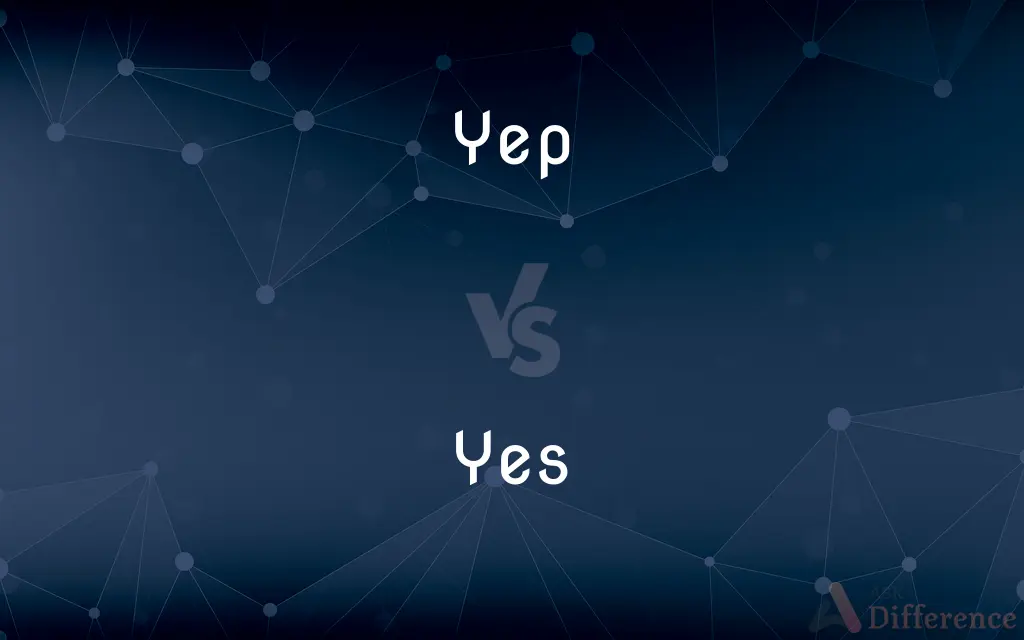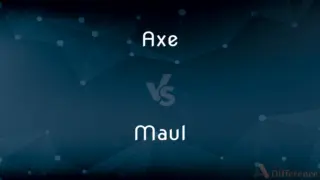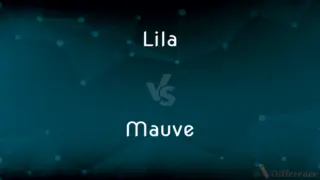Yep vs. Yes — What's the Difference?
By Fiza Rafique & Urooj Arif — Updated on April 22, 2024
"Yep" is a casual, informal affirmation, while "yes" is more formal and universally accepted in both casual and formal contexts.

Difference Between Yep and Yes
Table of Contents
ADVERTISEMENT
Key Differences
"Yep" is often used in informal conversations or casual settings, conveying agreement or affirmation in a relaxed manner. On the other hand, "yes" is appropriate in both informal and formal situations, serving as a standard affirmative response across various contexts.
While "yep" adds a friendly or laid-back tone to dialogues, "yes" can express consent, agreement, or acknowledgment more universally, maintaining neutrality in tone.
In written communication, "yep" might appear in texts or casual emails, reflecting a conversational style. Whereas, "yes" is suitable for official documents, professional emails, and settings that require a clear and formal tone.
Usage of "yep" can suggest familiarity and ease between speakers, implying a less formal relationship. In contrast, "yes" does not necessarily imply any specific level of intimacy or formality between the communicators.
While "yep" is predominantly a feature of American English, "yes" is used globally, understood and recognized in all varieties of English as the standard affirmative.
ADVERTISEMENT
Comparison Chart
Formality
Informal
Formal and informal
Tone
Casual, friendly
Neutral, professional
Preferred Context
Casual conversations, informal writing
All contexts, including formal documents and speeches
Implication of Relationship
Implies familiarity and informality
No implication of specific relationship
Global Usage
Predominantly American English
Universal in all varieties of English
Compare with Definitions
Yep
An informal way to say yes.
Yep, I'll be there in five minutes.
Yes
A word used to give a positive answer or reply to a question, request, or offer.
Yes, I accept your offer.
Yep
Used in casual acknowledgment.
Yep, I understand what you're saying.
Yes
A polite way to confirm understanding.
Yes, I will make sure it is done by tomorrow.
Yep
A quick affirmation in informal chats.
Can you help me? Yep!
Yes
Employed to show enthusiasm or strong agreement.
Yes! That’s exactly what we need!
Yep
Used to express agreement with a previous statement.
Yep, that's exactly what happened.
Yes
Used to express agreement with an assertion or suggestion.
Yes, I believe that's the best decision.
Yep
A casual response to confirm receipt of a message.
Yep, I got your text.
Yes
An affirmation used in formal settings.
Yes, Mr. Chairman, I agree.
Yep
Yes.
Yes
Used to give an affirmative response
‘Do you understand?’ ‘Yes.’
Yep
(informal) yes.
Yes
Used as a response to someone addressing one or trying to attract one's attention
‘Oh, Mr Lawrence.’ ‘Yes?’
Yep
(informal) Yes.
I'll take that as a yep, then.
Yes
Used to question a remark
‘It should be easy to check.’ ‘Oh yes? How?’
Yes
Encouraging someone to continue speaking
‘When you bought those photographs …’ ‘Yes?’
Yes
Expressing great pleasure or excitement
Plenty to eat, including hot hamburger sandwiches (yes!)
Yes
Expressing irritation or impatience
‘Is the pain still there?’ ‘Yes, yes, damn you, the pain is always there’
Yes
An affirmative answer or decision, especially in voting
Answering with assured and ardent yeses
Yes
It is so; as you say or ask. Used to express affirmation, agreement, positive confirmation, or consent.
Yes
An affirmative or consenting reply.
Yes
An affirmative vote or voter.
Yes
To give an affirmative reply to.
Yes
Used to express great satisfaction, approval, or happiness.
Yes
(interrogative) Used to ask for more information with a request.
I need some help.
Yes?
Yes?
Yes
An affirmative expression; an answer that shows agreement or acceptance.
Was that a yes?
Yes
A vote of support or in favor/favour of something.
The workers voted on whether to strike, and there were thirty "yeses" and one "no".
Yes
To agree with, affirm, approve.
Did he yes the veto?
Yes
(slang) to attempt to flatter someone by habitually agreeing
Yes
Ay; yea; - a word which expresses affirmation or consent; - opposed to no.
Yes
An affirmative;
I was hoping for a yes
Common Curiosities
Is "yep" acceptable in professional communication?
"Yep" is generally considered too casual for formal professional communication, where "yes" is preferred.
Are there scenarios where "yep" is more appropriate than "yes"?
"Yep" may be more appropriate in casual or informal interactions among friends or peers where a relaxed tone is common.
Can "yep" be considered rude?
"Yep" is not typically considered rude, but its informality might be perceived as overly casual or dismissive in more formal or respectful settings.
Is "yep" found in English dictionaries?
Yes, "yep" is recognized in English dictionaries as an informal variant of "yes," typically noted for its casual use.
How did "yep" evolve in English?
"Yep" likely evolved as a colloquial form of "yes," adapting a more casual pronunciation that reflects a relaxed speaking style.
Can "yep" be used in creative writing?
"Yep" can be effectively used in creative writing to convey character traits, regional dialects, or a casual conversational tone.
Are there age or generational preferences for using "yep" over "yes"?
Younger or more digitally-inclined generations might favor "yep" in casual digital communication, whereas older generations might prefer the more traditional "yes."
How do cultural differences affect the use of "yep" and "yes"?
Cultural differences can influence the perception of formality and informality; "yes" is universally understood and accepted, while "yep" might be viewed differently across different English-speaking cultures, often leaning towards American English usage.
Why is "yes" used more frequently than "yep" in writing?
"Yes" is more universally understood and appropriate for a broader range of contexts, making it the preferred choice in writing, especially in formal or professional documents.
Do other languages have equivalents to "yep"?
Many languages have informal variants of their words for "yes," though these may not directly translate to "yep" but serve a similar function in casual speech.
What impact does using "yep" or "yes" have on the tone of a conversation?
Using "yep" generally makes the conversation seem more informal and friendly, while "yes" can maintain or introduce a more serious or formal tone.
In what media is "yep" more commonly seen?
"Yep" is frequently seen in informal digital communications, such as texts and social media, reflecting a conversational style.
What guidelines should one follow when choosing between "yep" and "yes"?
The choice between "yep" and "yes" should consider the formality of the setting, the relationship between the communicators, and the desired tone of the conversation.
Is "yep" considered less respectful than "yes"?
In certain contexts, particularly formal or professional ones, "yep" might be perceived as less respectful due to its casual nature, whereas "yes" is always seen as respectful.
How does the use of "yep" vs. "yes" affect non-native English speakers' understanding?
Non-native speakers might find "yes" easier to understand and recognize due to its prevalence in formal English education, while "yep" might require more contextual or cultural knowledge.
Share Your Discovery

Previous Comparison
Axe vs. Maul
Next Comparison
Lila vs. MauveAuthor Spotlight
Written by
Fiza RafiqueFiza Rafique is a skilled content writer at AskDifference.com, where she meticulously refines and enhances written pieces. Drawing from her vast editorial expertise, Fiza ensures clarity, accuracy, and precision in every article. Passionate about language, she continually seeks to elevate the quality of content for readers worldwide.
Co-written by
Urooj ArifUrooj is a skilled content writer at Ask Difference, known for her exceptional ability to simplify complex topics into engaging and informative content. With a passion for research and a flair for clear, concise writing, she consistently delivers articles that resonate with our diverse audience.














































